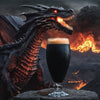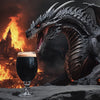Orange Chocolate Dragon's Fuel Imperial Stout Extract Beer Recipe Kit
Ride the Orange Chocolate Dragon!
Clone Recipe of New Holland Brewing Company's Orange Chocolate Dragon's Milk Imperial Stout
What does this beer taste like?
Dragon's Fuel Imperial Stout Extract Beer Recipe Kit is a renowned and utterly black brew aged on bourbon-infused oak that delivers a complex and indulgent drinking experience. The bourbon-oak aging imparts flavors of vanilla, roasted malt, and a subtle bourbon sweetness. It boasts a full-bodied character with a velvety smooth texture and a pleasant warmth from its 11% ABV. The beer showcases notes of dark chocolate, coffee, and caramel, making it an obvious choice for those who appreciate a well-balanced, intense stout.
Note: This recipe requires the brewer to supply 18 oz bourbon
And now for the possibly funny, possibly serious, possibly irreverent flowery description....
Upon a midnight dark and stout,
A dragon, fierce, with fiery spout,
Whose scales gleamed with obsidian sheen,
A guardian of the night unseen.
In caverns deep, where secrets dwell,
She kept her lair, a fiery hell,
With eyes that burned like molten ore,
She yearned for more and evermore.
Imperial stout, her chosen brew,
A potion strong, a blackened hue,
It stoked her flames, her inner fire,
And filled her heart with dark desire.
Through moonlit skies, she soared on high,
In search of stout, her endless sky,
Her breath, a fiery, smoky trail,
Her thirst for stout, a timeless tale.
In the stillness of the blight,
She sought the beer, her source of might,
A dragon's brew, her heart's delight,
In the realm of crescent night.
Imperial stout, her fiery fuel,
In darkness deep, her soul did rule,
A dragon's thirst, forever sowed,
In the stout's embrace, her flames did glow.
All About Imperial Stout
Imperial Stout is the big bad boy of stouts that has captivated the palates of beer enthusiasts for centuries. Its historical origins can be traced back to 18th-century England, with a notable evolution into the even brawnier style that we know today.
Historical Origins: Imperial Stout originated in the United Kingdom. It was created in the 18th century to satisfy the Russian Imperial Court's commendable thirst for bold, dark ales. These strong, rich beers were exported to Russia and thus became known as Russian Imperial Stouts. The higher alcohol content and robust character of Imperial Stouts made them able to survive their long journeys.
The early Imperial Stouts were known for their dark color, high alcohol content, and a rich, complex flavor profile. Their flavors often featured roasted malts, dark fruits, and a certain sweetness that helped balance the bitterness from the roasted grains. Over time, various British breweries produced their own versions of Imperial Stout, each with its unique twist on the style.
Evolution into the Modern Style: The evolution of Imperial Stout is intertwined with the changing landscape of the brewing industry. During the late 19th and early 20th centuries in the UK, the popularity of Imperial Stout began to fade due to changing preferences and the emergence of lighter beer styles. This led to a decline in the production of traditional Imperial Stouts.
However, late in the 20th century during the first wave of the craft beer revolution, Imperial Stout made what we happily consider a triumphant return. Breweries in the United States and around the world began to experiment with the style, pushing its boundaries and redefining the Imperial Stout category.
Modern Imperial Stouts share several key characteristics:
-
Higher Alcohol Content: Imperial Stouts typically have an elevated alcohol by volume (ABV) ranging from 8% to 12% or even higher. This not only gives them a warming quality but also allows for aging and maturation, even more so than their historical counterparts.
-
Rich and Complex Flavor Profile: Modern Imperial Stouts exhibit a wide range of flavors, including dark chocolate, roasted coffee, caramel, toffee, and dark fruits. These complex flavors are achieved through the use of various malts and aging in barrels.
-
Roasty and Bitter Notes: Roasted barley and malt provide the characteristic dark color and impart roasted, sometimes bitter, notes. This bitterness is balanced by the sweetness from residual sugars and high alcohol content.
-
Aging in Barrels: Many modern examples of Imperial Stouts benefit from aging in bourbon, whiskey, or other spirit barrels. This aging process can add layers of complexity, as the beer absorbs flavors from the wood and the previously held spirits.
-
Variety and Creativity: Craft breweries have fully embraced the Imperial Stout style, resulting in a vast array of variations, such as flavored Imperial Stouts (e.g., chocolate, coffee, vanilla, or chili-infused), dessert-themed stouts, and pastry stouts, which incorporate elements of desserts like pie or cake.
Imperial Stout has come a long way from its origins as a beer brewed for Russian royalty. Today, it remains a symbol of brewing innovation and creativity, with brewers constantly pushing the boundaries to create new and exciting variations of this bold and indulgent beer style. Whether you're sipping a classic Russian Imperial Stout or a modern, barrel-aged creation, the allure of this style continues to enchant beer enthusiasts around the world.







